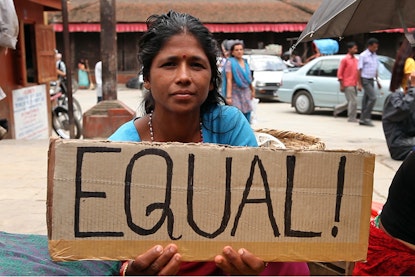Where is the equality? A look at gender equality and social inclusion data in Nepal’s procurement system

Ms. Acharya is Assistant Professor at Center for Research and Development, King’s College.
“Being a woman, it’s not easy to break the barriers and come out of the comfort zone, especially in a country like ours, where we still have a patriarchal system. Initially, it was very difficult to gain trust and make people believe that a woman can also work in the procurement sector which still is male.”
Yamuna Bhatta is one of the female contractors in Dhangadi, Nepal. For the past 12 years, she has worked tirelessly to be a successful businesswoman in her community. But her path to success has not been a smooth one. Cultural as well as political barriers make it difficult for women like Yamuna or members of minority communities to work with the government.
Public procurement is about one-fifth of global gross domestic product (GDP) in Nepal. Despite being a significant contributor to the country’s GDP, gender equality and social inclusion measures in public procurement continue to be ignored. Representation of marginalized or disadvantaged communities, whether it be women or excluded social groups, is remarkably low, especially in developing countries. Nepal is no exception to this. The procurement process has ineffective laws, policies, and regulations. Not only has this limited gender equality and social inclusion of minorities in government contracts but has also questioned the sustainability of these projects.
Equality for women and minorities is an important pillar for economic empowerment and sustainable development. To identify solutions, we need to better understand the data and the extent of the role of women-led business in public contracting. This includes the share of female contractors and contractors representing marginalized communities, contracts won by female contractors and contracts won by members of marginalized communities, and contracts with gender equality measures approved by municipalities. As part of a new project, we’ve looked at these numbers for the first time.
The results are remarkably low. For example, out of 506 total contractors registered in the Federation of Contractors Association in Kailali municipality, only one in ten are women and 12.3 % contractors belong to marginalized communities. Of the contracts won, 12 projects completed in the fiscal year 2016/17 were monitored. Not a single project was won by female contractors while one project was won by the contractor from the marginalized community. Of contracts with gender equality measures specified, none of the contracts were approved by the municipality.
No attempt so far has been made to integrate gender equality in government contracts. In practice, this would mean reducing the gender gap in labor markets, encouraging women-led firms to secure public contracts through gender-friendly policies, and a gender-balanced composition of the project team. In the absence of an effective procurement monitoring system and timely open data to support it, it is unlikely to know the extent to which companies run by women and socially excluded groups are able to win contracts.
Recently, Nepal’s transition from a centralized to a federal government in 2015 has opened doors for women and minority groups to participate more fully in the procurement process. This is expected to bring government closer to the people and lead to a more inclusive development process. Local policies can be drafted and implemented locally leading to more participation, and with it, a potential to significantly change the lives of women and excluded groups.
The Public Procurement Act 2016 acknowledges that the Nepalese law on public procurement does not have specific provisions for women and socially excluded groups that contracting authorities should take into account.
Equality issues in Nepal are not limited to regulatory or legislative barriers. To actively participate in procurement projects, women and minority groups face various social challenges as well. Language limits access to information and services. The lack of property ownership reduces the opportunity to access capital by preventing women and minority groups from meeting collateral requirements and accessing larger loans to participate in the project. Socio-cultural barriers impact the level of mobility, self-confidence, and ability to access services and participate in the public sphere.
Nepali society has ingrained discrimination across gender, caste, and ethnic group which is difficult to overcome. Specifically for women, the patriarchal culture restricts women’s participation in society to the household and bringing up children.
Yamuna thinks preferential policies to encourage women’s participation help with these barriers. “At present, no such facility exists, thus, women participation is nominal. It would be nice if certain reservation is made for female contractors.” Bringing more equal opportunities to public procurement in Nepal will be difficult, but not impossible. This is why encouraging a public e-procurement system and advocating for open contracting will help bring light to these issues and, hopefully, be a catalyst for change.